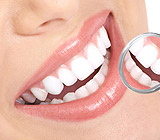Whitening is a Safe and Effective Way to get That “Hollywood Smile”
 The “Hollywood Smile” — dazzlingly white — is associated in our society with youth, health and vitality. Achieving that smile through either professional or home whitening applications has become very popular.
The “Hollywood Smile” — dazzlingly white — is associated in our society with youth, health and vitality. Achieving that smile through either professional or home whitening applications has become very popular.
Teeth become discolored or dull for a number of reasons. It can be something intrinsic with the teeth — changes in enamel or dental structure during development, inherited disorders, heavy exposure to fluoride or tetracycline, or changes in mineral structure or wear due to aging. It can also be extrinsic, resulting from environmental or lifestyle causes. Eating foods with tannins (red wine, coffee or tea) or carotene pigments found in plant foods like oranges or carrots, or using tobacco may all cause staining.
Most modern applications involve an oxidizing chemical (usually hydrogen peroxide) that bleaches the teeth. Professional applications in a dentist’s office use high concentrations of hydrogen peroxide (usually 35 to 45%) applied directly to the teeth with control measures to protect the lips and gums. This type of application can lighten the color of teeth up to ten shades.
There are a number of home options too: whitening strips, “Paint on” or “Brush on” whitening, and even whitening gum. We can also provide you with a “Take home” kit that resembles the professional application but is generally less expensive. Although all these home applications are generally safe and effective, they typically take longer for results (several repeated days as opposed to about one hour for an office application), and not always to the same level of lightness as the professional.
Just about anyone can be a candidate for a whitening application. However, if you have thinner than normal dentin and more porous enamel, or suffer from gum recession or enamel loss, then whitening may increase tooth sensitivity. And, whitening is not a permanent solution: the brightness will fade over time, usually within a year. You can slow the fading by avoiding foods and habits that contribute to staining. It’s also possible to touch up the initial whitening once or twice a year to extend the life of your new, bright smile.
If you would like more information on teeth whitening, please contact Dr. Cindy Sumarauw at 801-281-3500 to schedule an appointment for a consultation. You can also learn more about this topic by reading the Dear Doctor magazine article “Teeth Whitening.”


Leave a Reply